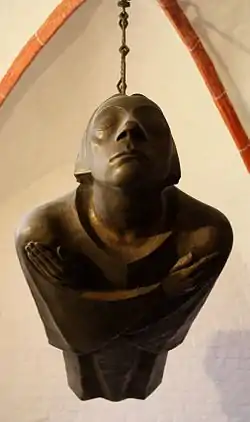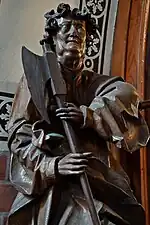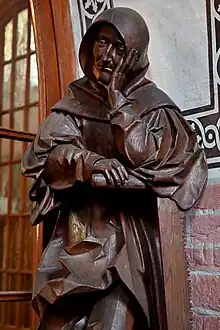| Güstrow Dom | |
|---|---|
| Minster/Collegiate church of St. Mary, St. John the Evangelist and St. Cecilia | |
Dom St. Maria, St. Johannes Evangelista und St. Cäcilia | |
 | |
| 53°47′28″N 12°10′24″E / 53.7910°N 12.1734°E | |
| Location | Güstrow |
| Country | Germany |
| Denomination | Evangelical Lutheran Church in Northern Germany |
| Architecture | |
| Style | Brick Gothic |
The Dom ("cathedral") is a Brick Gothic Lutheran church, the largest church in the German city of Güstrow. It was built as a collegiate church and has never actually been a cathedral. Initially completed in 1335, the church is the oldest extant building in Güstrow.[1] It houses the sculpture Der Schwebende ("The Floating One"), a war memorial created by Ernst Barlach.[2] The apostle figures by Claus Berg are also very well known. They are also called the Güstrow Apostles

Der Schwebende by Ernst Barlach, hanging in Güstrow Cathedral
Gallery with the famous Apostle figures by Claus Berg
 Andreas with the cross
Andreas with the cross Bartholomäus with the knife
Bartholomäus with the knife Jakobus the older one with the pilgrim's hat
Jakobus the older one with the pilgrim's hat Jakobus the younger one with the walker
Jakobus the younger one with the walker Johannes with the poison chalice
Johannes with the poison chalice Judas Thaddäus with the halberd
Judas Thaddäus with the halberd Matthäus with the dipstick
Matthäus with the dipstick Matthias with the hatchet
Matthias with the hatchet Petrus with the keys
Petrus with the keys Philippus with the cross
Philippus with the cross Simon with the saw
Simon with the saw Thomas with the lance
Thomas with the lance
External links
- Dom zu Güstrow website (in German)
References
- ↑ "Barlach Town Güstrow". European Route of Brick Gothic. Archived from the original on 13 November 2014. Retrieved 6 November 2014.
- ↑ Malik, Kenan (23 October 2014). "Germany's History Lesson for Britain". The New York Times. Retrieved 6 November 2014.
This article is issued from Wikipedia. The text is licensed under Creative Commons - Attribution - Sharealike. Additional terms may apply for the media files.